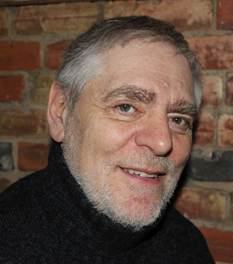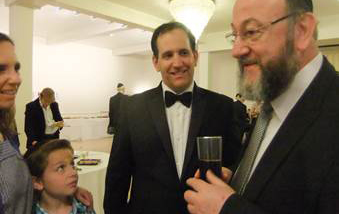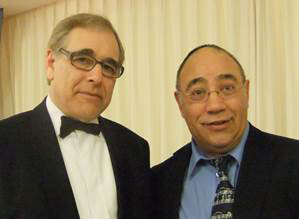
| Home | About ECA | Activities | Articles | Reviews | Newsletters | Photos | Latest news | Contact us |
 A personal view of the 8th European Cantors' Convention, held in London in June 2013.
A personal view of the 8th European Cantors' Convention, held in London in June 2013.
By CHARLES HELLER, Retired Choir Director at Beth Emeth Synagogue in Toronto, and a consultant editor for the Cantors Assembly of New York. Toronto See Charles Heller's full biography at the end.
I had the honour of being a guest speaker at the recent European Cantors Association convention, and was invited by Geraldine Auerbach, the Executive Officer, to report on my impressions.
Having worked with the Cantors Assembly of New York over the past 35 years, I found it exciting to see the establishment of a new cantorial organisation.
The ECA presents a bold image: a striking logo and a bold mission statement: “The Future of Synagogue Music”. Here is an organisation determined to lead us as we wage our war to strengthen traditional liturgical practice – and make no mistake, comrades, we are indeed fighting a war.
We depend on our chazzanim to uphold and enhance our traditional nusach, which is the foundation of synagogue liturgy. Nusach is attacked as an outmoded style of music, but in truth it is constantly changing and hence is not ‘outmoded’ but ‘timeless’.
While there is certainly no ‘universal nusach’ that we all agree on, there is most certainly a universal concept of nusach: music to make you aware during each service that you are participating in a communal event whose purpose is the sanctification of the day.
No-one who ever learnt correct nusach ever wanted to abandon it.
Taking every opportunity
The ECA is valiantly taking every opportunity to publicise these ideas, for example through many fine interviews given in the press by Steven Leas, [Cantor of the Central Synagogue London] and to counter attacks based on ignorance.
The main goal of this convention was to provide seminars to model basic nusach for relatively inexperienced cantors. This was done admirably through presentations by Cantors Sol Zim (from New York) and Yechezkel Klang (Israel).
Each gave masterful demonstrations of nusach, often focusing on tiny details of music and of punctuation so as to bring out the deepest significance of the words, which most of us take for granted.
Sol Zim also led rousing sessions of his celebrated participatory melodies which are tailored to help congregants with little or no Hebrew education feel at home in the service.
 The convention was held at the Central Synagogue, with support from the Jewish Music Institute. Chief Rabbi elect Mirvis is shown here with Central's Cantor, Steven Leas, and his family.
The convention was held at the Central Synagogue, with support from the Jewish Music Institute. Chief Rabbi elect Mirvis is shown here with Central's Cantor, Steven Leas, and his family.
There were about 40 participants, from England, Canada, USA, South Africa, Germany, Eastern Europe and Israel. Hopefully in future years the convention will attract more participants from France and elsewhere in Western Europe, not to mention from the UK itself.
Unfortunately, there remains the fact that most cantors nowadays are part-time, and cannot easily spare 3 days away from their regular work.
Many outstanding sessions
The convention featured many outstanding sessions:
There were regular masterclasses offered by Cantors Zim and Klang to anyone prepared to get up on stage and deliver some chazzanut– we all admire those brave souls who were willing to be pulled apart in public, albeit in the most supportive way. (But here’s my own comment: It is depressing to see how many cantors are eager to sing a piece with no idea what key they should be in. I have worked with cantors who would spend hours on a single piece, just experimenting in order to find the key that would show their voice at its best. The moral is: if you take yourself seriously, your listeners will take you seriously too….).
Rabbi Geoffrey Shisler gave a penetrating lecture on the halachic requirements of a chazzan, Stephen Levey led a workshop on choral compositions for children’s choir, and Eliot Alderman presented some gems from the Spanish and Portuguese nusach.
Eric Moses’ talk on the duties of the cantor in the 21st-century hit home with the force of a keynote speech - we hope it will be printed and distributed separately.
(As for my own presentation, let me just say it was a pleasure to have the opportunity to talk about my book What To Listen For in Jewish Music - if you missed it, you can buy a copy at Foyles (music department) or at Steimatzky’s in Golders Green.)
A highlight was the address by Chief Rabbi-elect Ephraim Mirvis, who spoke eloquently on the importance to the community of maintaining the position of the cantor, as well as the need for the cantor to have high visibility in the day-to-day affairs of the community.
Obviously as more and more synagogues prefer to relegate the cantor to a part-time position in deference to assistant rabbis, it will need extra determination on the cantor’s part to meet this challenge.
Julian Klein Memorial Concert
The convention also hosted the Julian Klein Memorial Concert – a major event featuring the convention’s presenting chazzanim, with guest appearances by cantors Alex Stein (Toronto) and Moshe Fishel (Munich), together with no less than six choirs – the Central Synagogue Choir, London Jewish Male Choir, Ne’imah Singers, Shabbaton Choir, the Choir of the Spanish and Portuguese Community and Hertsmere Jewish Preparatory School Choir.
They were all supported with outstanding accompaniment from Alexander Knapp and Jeremy Limb (piano), Miriam Kremer (violin) and Dave Shulman (clarinet).
It was a memorable occasion, with repertoire ranging from the very familiar Rachel Quand du Seigneur to the limpid traditional music of the Spanish-Portuguese community, the latter featuring boy soprano Aurele Tobelem who beautifully demonstrated the appropriate technique for this bel canto material.
We were especially privileged to hear two major contemporary liturgical pieces performed by their composers – Sol Zim’s Avinu Shebashamayim and Stephen Levey’s Oseh Shalom – an unforgettable rousing Grand Finale involving all the artists and all six choirs.
But despite these first-rate artists and program, there were many empty seats –where were London’s other cantors, choristers and music-lovers?
 It would be wonderful to build up attendance at the ECA convention to the point where it resembled the Cantors Assembly conventions of yore, which used to attract hundreds of cantors (most of them full-time) to come with their families to learn new tunes, to attend sessions on the meaning of the prayers and new methods of inspiring their congregations, presented by the greatest scholars and artists, all in a convivial atmosphere, after which the participants would return back to their home communities charged with new energy and enthusiasm.
It would be wonderful to build up attendance at the ECA convention to the point where it resembled the Cantors Assembly conventions of yore, which used to attract hundreds of cantors (most of them full-time) to come with their families to learn new tunes, to attend sessions on the meaning of the prayers and new methods of inspiring their congregations, presented by the greatest scholars and artists, all in a convivial atmosphere, after which the participants would return back to their home communities charged with new energy and enthusiasm.
To develop this support for the ECA convention would require the willingness of more of our own established cantors to attend and mentor the new generation.
Many thanks to Geraldine Auerbach, Steven Leas and Alex Klein (Alex is pictured here, right, next to former President of the United Synagogue, Simon Hochhauser) for organizing such a memorable convention, not to mention the indefatigable Barbara Rosenberg who kept everything ticking over smoothly - may they and the ECA go from strength to strength.
About the writer
Charles Heller recently retired after 30 years as Choir Director at Beth Emeth Bais Yehuda Synagogue, Toronto, where he worked closely with the late Cantor Louis Danto and Cantor Aaron Bensoussan.
The synagogue was awarded the United Synagogue of America Schechter Award for Music in 1982. Charles has also performed with major twentieth-century figures such as Cantor David Kusevitsky, Rabbi Shlomo Carlebach and Marvin Hamlisch.
His arrangements and original compositions are performed in synagogues and in concerts throughout the world. In 2010 he gave a short lecture tour at the Hebrew University, Jerusalem, and the Tel Aviv Cantorial Institute.
He is a member of the editorial board of the Cantors Assembly, New York and is the author of the award-winning book What To Listen For in Jewish Music (www.ecanthuspress.com).
He has been an Associate Composer of the Canadian Music Centre since 2011. His recent compositions include the song cycles Letters From Bozena (premiered in London by Rivka Golani and Duo Bohemia, 2010) and Tramvay Lider (premiered Toronto 2012, supported by a grant from Heritage Canada).
Updated 21st July 2013
